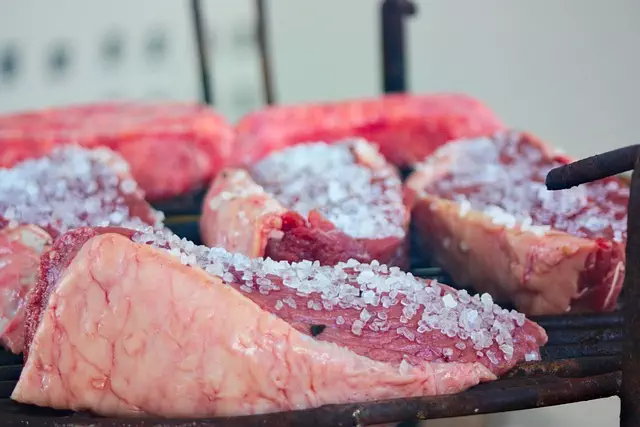Passionflower and kratom herbs are natural alternatives for anxiety relief, offering sedative and calming effects. Passionflower, with its flavonoids and alkaloids, enhances GABA activity, while kratom's mitragynine reduces anxiety and manages stress. Dosages vary depending on the herb form; starting ranges are 45-90 mg for passionflower and 1-3 grams of dried kratom leaf or 200-600 mg in capsule form. Always consult healthcare professionals before using these herbs, especially with underlying health issues or other medications.
Unwind and discover the potential power of nature’s allies in soothing anxious minds. This article delves into passionflower, a botanical renowned for its calming effects on anxiety, and explores its role as a complementary therapy. We also shine a light on kratom herbs, another herbal remedy gaining attention for mental wellness. By understanding these natural solutions and their safe use, you can navigate the path to better anxiety support alongside conventional practices. Embrace the potential of these herbs and botanicals for a holistic approach to calmness.
- Understanding Passionflower and Its Effects on Anxiety
- Kratom Herbs as a Complementary Approach for Mental Well-being
- Exploring Safe Use and Dosage Considerations for Passionflower and Kratom
Understanding Passionflower and Its Effects on Anxiety

Passionflower, scientifically known as Passiflora, is a genus of vines renowned for their intricate flower structures and lush foliage. Among its many species, Passiflora caerulea has gained attention for its potential anxiety-relieving properties, making it an intriguing addition to the world of natural remedies. This herb has been used in traditional medicine practices for centuries, particularly in South America and Europe, where it’s regarded as a powerful calming agent.
The effects of passionflower on anxiety are attributed to its unique chemical composition. It contains various flavonoids, volatile oils, and alkaloids that interact with the body’s natural systems. Research suggests that passionflower may enhance GABA (gamma-aminobutyric acid) activity in the brain, a neurotransmitter known for promoting relaxation and reducing anxiety. This mechanism of action is similar to that of certain prescription anti-anxiety medications, making passionflower a promising herbal alternative or adjunct therapy for those seeking natural support for their anxiety. Additionally, its calming properties extend beyond GABA modulation, as various studies point to its ability to influence other neurotransmitters and receptors involved in stress response regulation.
Kratom Herbs as a Complementary Approach for Mental Well-being

Kratom herbs and botanicals have gained attention as a complementary approach to supporting mental well-being, especially when paired with traditional treatments. These natural substances offer a range of compounds that interact with the body’s systems, potentially aiding in anxiety relief and stress management. The active ingredients in kratom, such as mitragynine and 7-hydroxymitragynine, have been studied for their calming effects and ability to modulate mood.
Often used as a herbal remedy, kratom is known for its diverse therapeutic properties. Research suggests that specific strains and preparations can help reduce symptoms of anxiety and promote relaxation without the side effects associated with some prescription medications. As with any complementary therapy, it’s essential to consult healthcare professionals before incorporating kratom herbs into your wellness routine, especially when managing anxiety.
Exploring Safe Use and Dosage Considerations for Passionflower and Kratom

When considering herbal remedies for anxiety support, it’s crucial to explore safe use and dosage considerations. Passionflower and kratom are two popular herbs and botanicals that have gained attention for their potential calming effects. However, understanding their appropriate usage is essential. Passionflower, scientifically known as Passiflora incarnata, has been used traditionally for its sedative and anxiolytic properties. Modern research suggests it may help reduce symptoms of anxiety and improve sleep quality. Kratom, or Mitragyna speciosa, is another herb making waves in the wellness world, known for its opioid-like effects that can provide pain relief and relaxation.
Dosage varies depending on the form of these herbs (tinctures, capsules, powder) and individual tolerance. Starting with low doses and gradually increasing is recommended. For passionflower, a typical dosage range is 45-90 mg, taken two to three times daily. Kratom dosages are more variable, but generally, 1-3 grams of dried leaf powder or 200-600 mg in capsule form can be started, with adjustments based on desired effects and individual response. Always consult a healthcare professional before incorporating passionflower or kratom into your anxiety support routine, especially if you’re taking other medications or have underlying health conditions.
Passionflower and kratom herbs offer promising complementary approaches for managing anxiety, each with its unique benefits. While passionflower has been shown to reduce anxiety symptoms and improve sleep quality, kratom herbs provide a multifaceted effect on mental well-being. However, it’s crucial to approach these natural remedies with caution and proper understanding. Always consult healthcare professionals before integrating them into your routine, ensuring safe use, and considering appropriate dosages. With the right guidance, kratom herbs and botanicals like passionflower can enhance traditional treatments, promoting a holistic path to better mental health.






